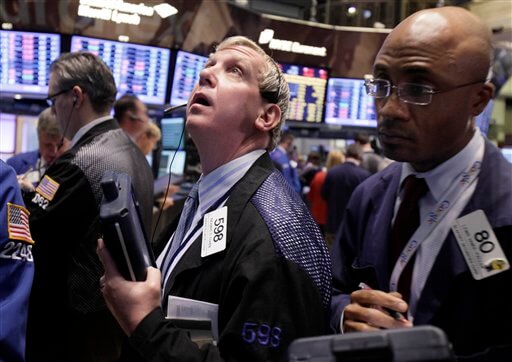
Congress’ latest failure to resolve federal budget gridlock sent stocks plunging Monday. The Dow Jones industrial average fell more than 300 points.
A 12-member bipartisan panel was supposed to agree on at least $1.2 trillion in budget cuts by Wednesday. The panel appeared ready to admit failure on Monday.
If the committee is unable to agree, it would trigger automatic spending cuts over 10 years starting in 2013. Analysts say that if Congress tries to dismantle those cuts it could lead to another downgrade of the U.S. government’s credit rating.
Uncertainty about federal spending hurts the fragile recovery because private-sector growth is so slow. The lack of an agreement also makes less likely a renewal of the payroll tax cut and extended unemployment insurance benefits. Both expire at the end of December. Economists say that will further drag on the economy.
The declines were broad as investors dumped stocks across the board. Energy and technology stocks fell the most. All 30 stocks in the Dow average fell, led by Hewlett-Packard Co. with a 5 percent drop. Only 10 stocks in the S&P 500 were trading higher.
The dollar and U.S. Treasury prices rose as investors moved money into assets seen as relatively safe. The yield on the benchmark 10-year Treasury note fell to 1.96 percent. It traded at 2.01 percent late Friday.
The Dow Jones industrial average is down 296 points, or 2.5 percent, at 11,500 at 11:20 a.m. Eastern time. The Standard & Poor’s 500 index is down 28, or 2.3 percent, at 1,187. The Nasdaq composite index is down 63, or 2.5 percent, at 2,509.
European markets also dropped. France’s CAC 40 lost 3.2 percent, and Germany’s DAX sank 3.3 percent.
Rating agency Moody’s warned Monday that France’s top credit rating remains under pressure as worries over Europe’s debt crisis have pushed the government’s borrowing costs higher. In weekly note, a Moody’s Investors Service analyst said that if high borrowing costs persist it would have “negative credit implications” for France’s triple-A credit rating.
In corporate news, two deals were announced early Monday. Gilead Sciences Inc. plans to buy drug developer Pharmasset Inc. for $11 billion. Pharmasset has an experimental hepatitis C drug in late-stage clinical trials. In early trading, Gilead fell 11 percent in morning trading while Pharmasset soared 85 percent.
Property and casualty insurer Alleghany Corp. agreed to buy the reinsurance company Transatlantic Holdings Inc. in a $3.4 billion deal. Transatlantic rose 1 percent in morning trading while Alleghany fell almost 9 percent.
The S&P 500 lost 3.8 percent last week, its worst weekly drop since mid-September. The steepest falls came Wednesday and Thursday after Moody’s warned that Europe’s debt crisis could hit the largest U.S. banks. The S&P 500 is now down 5.2 percent for the year.
___
Wagner reported from Washington.
Daniel Wagner can be reached at www.twitter.com/wagnerreports.
Copyright 2011 The Associated Press.

































